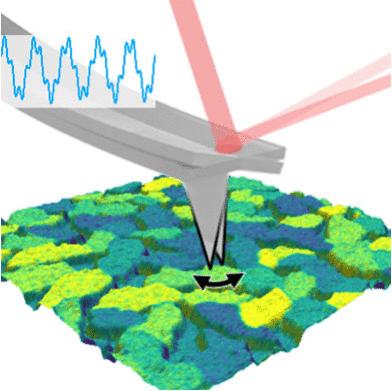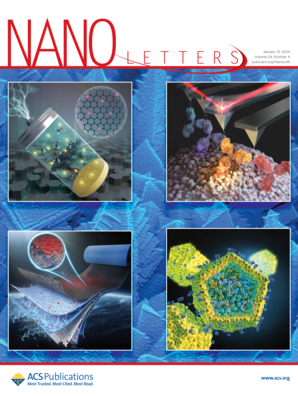Bimodal Atomic Force Microscopy with a Torsional Eigenmode for Highly Accurate Imaging of Grain Orientation in Organic Thin Films
IF 9.1
1区 材料科学
Q1 CHEMISTRY, MULTIDISCIPLINARY
引用次数: 0
Abstract
In organic electronics, the nature and spatial distribution of grains in polycrystalline thin films of small organic semiconductor molecules greatly impact the electronic properties of devices. Therefore, tools that accurately characterize organic films at the mesoscopic level are essential. To this end, we demonstrate here the power of a bimodal atomic force microscopy (AFM) with a torsional eigenmode for highly accurate imaging of grain orientations in organic thin films. The energy dissipated between the tip and sample during scanning depends on the in-plane crystalline orientation of each grain. This fact alters the cantilever torsional observables, allowing grain orientation recognition. Remarkably, bimodal AFM with the torsional eigenmode has important advantages, such as high sensitivity in the applied forces, true molecular resolution, and multiple parameters for regulating the image contrast, making it competitive with other well-established AFM methods for grain detection in organic thin films, namely, friction force microscopy and transverse shear microscopy.

具有扭转本征模的双峰原子力显微镜用于有机薄膜中晶粒取向的高精度成像
在有机电子学中,有机半导体小分子多晶薄膜中晶粒的性质和空间分布极大地影响着器件的电子性能。因此,在介观水平上准确表征有机薄膜的工具是必不可少的。为此,我们在这里展示了具有扭转特征模的双峰原子力显微镜(AFM)对有机薄膜中晶粒取向的高精度成像的能力。扫描过程中针尖和样品之间的能量耗散取决于每个晶粒的面内取向。这一事实改变了悬臂扭观测值,允许晶粒取向识别。值得注意的是,具有扭转特征模态的双峰AFM具有重要的优势,如对作用力的高灵敏度,真正的分子分辨率,以及调节图像对比度的多个参数,使其与其他成熟的AFM方法(即摩擦力显微镜和横向剪切显微镜)在有机薄膜中进行颗粒检测。
本文章由计算机程序翻译,如有差异,请以英文原文为准。
求助全文
约1分钟内获得全文
求助全文
来源期刊

Nano Letters
工程技术-材料科学:综合
CiteScore
16.80
自引率
2.80%
发文量
1182
审稿时长
1.4 months
期刊介绍:
Nano Letters serves as a dynamic platform for promptly disseminating original results in fundamental, applied, and emerging research across all facets of nanoscience and nanotechnology. A pivotal criterion for inclusion within Nano Letters is the convergence of at least two different areas or disciplines, ensuring a rich interdisciplinary scope. The journal is dedicated to fostering exploration in diverse areas, including:
- Experimental and theoretical findings on physical, chemical, and biological phenomena at the nanoscale
- Synthesis, characterization, and processing of organic, inorganic, polymer, and hybrid nanomaterials through physical, chemical, and biological methodologies
- Modeling and simulation of synthetic, assembly, and interaction processes
- Realization of integrated nanostructures and nano-engineered devices exhibiting advanced performance
- Applications of nanoscale materials in living and environmental systems
Nano Letters is committed to advancing and showcasing groundbreaking research that intersects various domains, fostering innovation and collaboration in the ever-evolving field of nanoscience and nanotechnology.
 求助内容:
求助内容: 应助结果提醒方式:
应助结果提醒方式:


